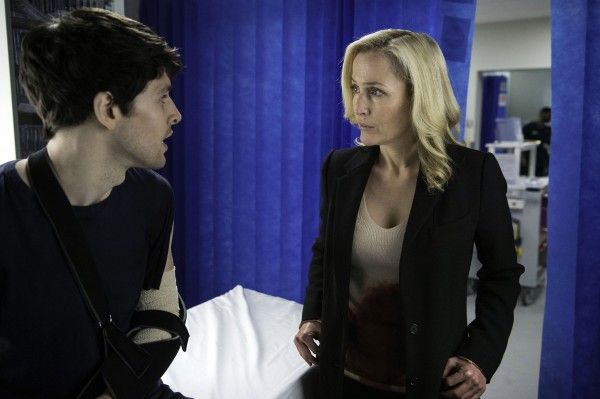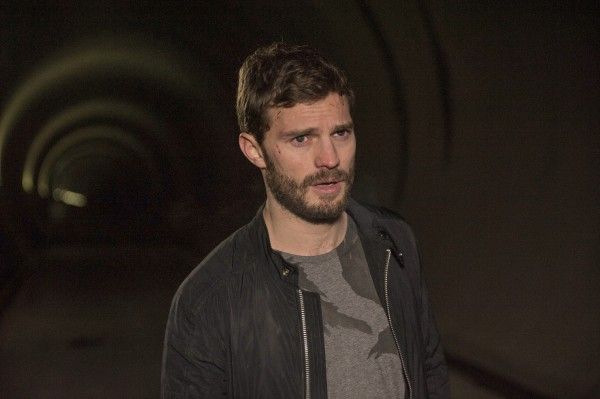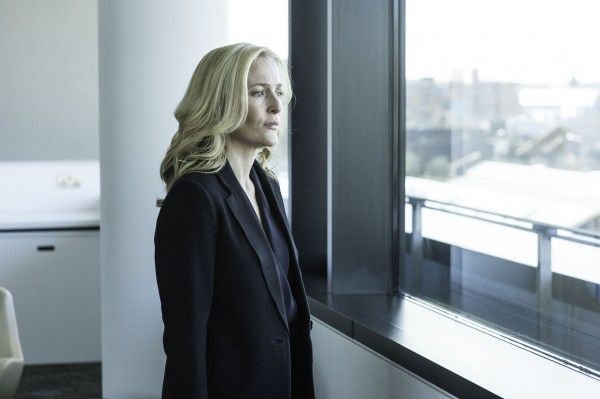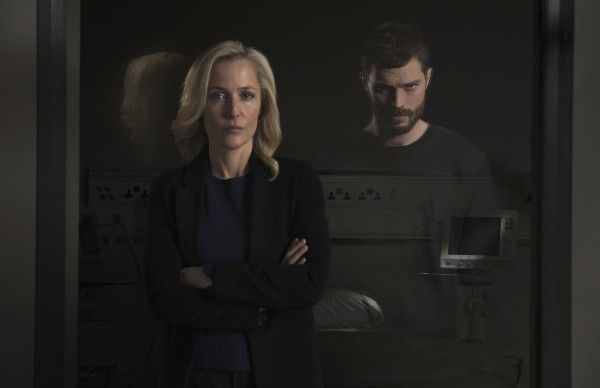Spoiler Warning: This articles discusses all available episodes of The Fall through the end of Season 3. If you haven't caught up, come back later! If you have seen the episodes or don't care about spoilers, proceed ...
If Season 3 is the last season of Netflix's The Fall, it went out on a strange note. An obsession with a killer almost brought one detective down, and it has seemingly done the same for the show itself. Still, that doesn't mean that, if we get a fourth season, all hope is lost for what used to be one of TV's best crime dramas. The Fall took a big gamble in its third season by slowing its storytelling down to a glacial pace, appearing at first to give space to examine the very nature of evil. It was different, and a little tantalizing, until that examination ended up being superficial, with other plotlines being lost along the way in favor of giving Gillian Anderson's Stella Gibson and Jamie Dornan's Paul Spector some incredibly long monologues told in hypnotic, icy whispers (Anderson) and low, even grumbles (Dornan).
To start, if you forgot how Season 2 ended, you might have spent the entire first hour of Season 3 confused as Paul (a.k.a. Peter Baldwin) struggled to live after being shot while in police custody. The Fall became, in its first two hours back, something of a medical show, where we were treated to the nuances of every incomprehensibly jargoned intervention by doctors to keep Paul breathing while Stella looked on. And in a way, that was a metaphor for this season. While the entire series so far is built on the cat and mouse game between them, and their mutual obsession, the focus in Season 3 was already drifting to becoming entirely Paul's, with Stella being an observer.
When poor Anderson (Colin Morgan), who was also shot at the same time as Paul, confronts Stella over her "anguish" at calling out "we're losing him!", she cooly says she simply didn't want him to get off that easily. She wanted to see him tried and punished. Of course, we know there's more to it than that, as Stella's own dreams later confirm. The Fall has reinforced the idea over and over again that women are powerless to Paul's masculine wiles, and that often unfortunately leads to their death (or near-death, as Valene Kane's Rose explains about the sex games they used to play). In Stella's case, it has bred an obsession both with bringing him to justice and with Paul himself. And Paul, it seems, feels the same way, wanting Stella's attentions and to extinguish her. They both get off on the game.
For a little while, maybe viewers felt the same way. The chess match between the two was augmented by Paul's personal struggle to live the life of an average family man while also being a deranged serial killer. In that first season, the show played with incredible tension where we could see both sides, and yet, couldn't predict what might come next. Season 2 then added some unfortunate elements -- namely the subplot with babysitter Katie (Aisling Franciosi) -- and allowed Paul to become the very kind of ubermensch that he believed himself to be. It continued to be utterly brutal, as well, with elongated scenes of torture (like with Rose), and appeared to end with Paul's death.
We were not, however, so lucky. Would Season 3 have been better if Paul had died? Instead, he clung to life and we got a new twist: his amnesia. Again, The Fall caused us to question who Paul really is, and in this case, is he a liar, or the victim of a brain trauma? Stella remains skeptical, and ultimately calls him out as being desperate for attention, which unleashes his darkness onto her with some ghastly violence that then continues throughout the final scenes.
But in between ... what was there? Stella gave her support to naive Sally's (Bronagh Waugh) cause, in which she was again proven right -- the fragile Sally considers suicide and attempts to take her children with her -- and also lends support to Katie and to Rose (one feels the women should start a Post Traumatic Paul Disorder support group). But we never get a follow-up with Sally, or anything of substance with the dark-haired, pale-skinned nurse who it seemed would clearly be an object of Paul's obsession and violence, not to mention Olivia's violent dreams like her father had. And remember that dangling plot thread about the defense lawyer coming after Stella for her inappropriate relationships with co-workers and possibly Paul himself? It felt like the other shoe dropping ... until Paul took care of everything himself.
So instead, we focused on his abusive upbringing, which Stella cautions his therapist should not cloud the knowledge that Paul brutally murdered four (and later, five) people. It's a caution for viewers as well, which raises another question: why delve into this twisted background with such breadth and depth at all? Is it meant to suggestion causation, or even act as an excuse? Does unveiling this other darkness bring any narrative satisfaction, or just more horror?
And then of course The Fall ended, problematically, with Paul still in control. He took his own life after what may have been a mercy killing, some act of vigilantism, or just to satisfy his hunger to extinguish life, and he did so in the way that he imposed on his victims. Was there an act of contrition in that? After his therapist tells him that he can be treated but not cured, something changes in him. It's in these small moments that The Fall can be exceptionally effective. Stella, for example, was given an entire season of thoughtful comments to a variety of characters about, essentially, what she has learned from this case and how it has changed her, and the wisdom she can impart to others because of it. And yet, it was still ultimately all about Paul.
Paul was an interesting character, but Stella is the reason to watch The Fall, and it feels like in many ways that Season 2 and 3 could have been condensed into Paul's final act while letting Stella move on afterwards. What's interesting now is what comes next. That final scene was all Anderson, who wordlessly conveyed a sense of relief (the killings are over), sorrow (over Paul evading justice, and of her losing such a fascinating target), and contemplation over the future while sitting in her kitchen drinking wine and mundanely looking through junk mail. With Burns having stepped down and a number of strong, young women who look up to Stella ready for their next case, one suddenly has a desperate hope for Season 4 (if it happens at all). We've seen the series as a story shared between Stella and Paul, though Season 3 became too enamored with the killer to give Stella the time she needed. Give her Season 4.






